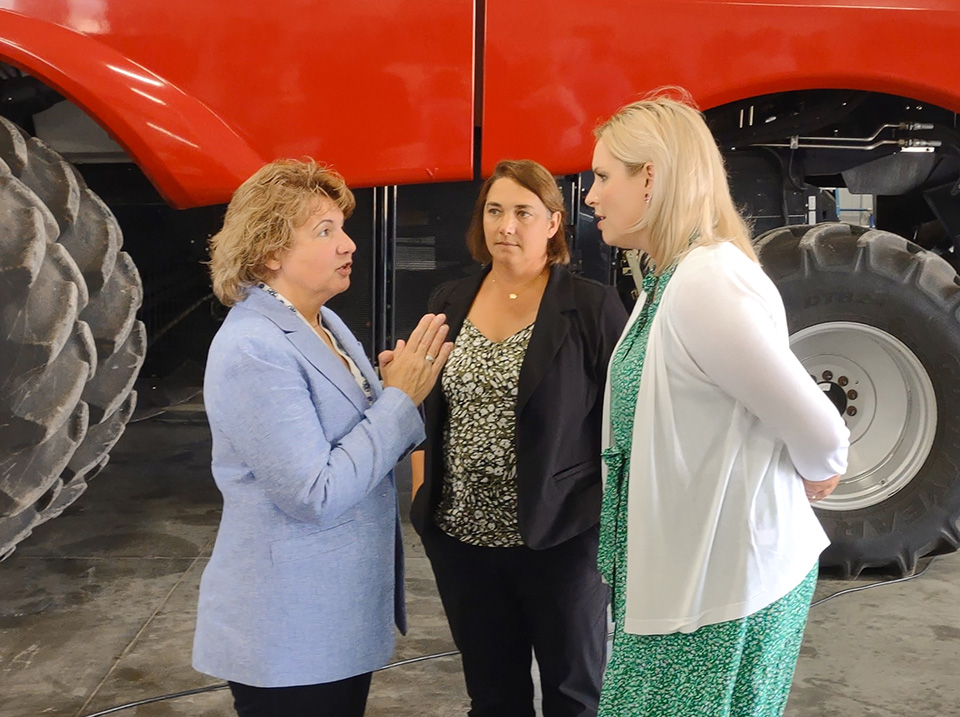
A Congressional Select Committee on the activities of the Chinese Communist Party met last week at Youngblut Ag in Dysart. From left, Benton County farmer Lori Lang, Will Cornelius from Cornelius Seed, Iowa Soybean Association President-elect Suzanne Shirbroun, Rep. Mike Gallagher (R-Wis.), Rep. Raja Krishnamoorthi (R-Ill.) and Rep. Ashley Hinson (R-Iowa), discuss the protection of U.S. intellectual property, specifically ag technology. (Photo: Iowa Soybean Association/Jeff Hutton)
Theft in the fields
October 1, 2023
More than a decade ago in Dysart, a farmer spotted a man, Mo Hailong, digging up hybrid corn seeds. Hailong then sent the seeds back to China. The FBI later arrested him and others, and they were charged with stealing approximately $30 million worth of U.S. ag technology. Other cases followed, including Xiang Haitao, who stole technical ag information from his employer, a Monsanto subsidiary. He was stopped at Chicago’s O’Hare Airport, where the FBI discovered an SD card in his possession, which contained the information.
Eleven years later, Iowa farmers including Iowa Soybean Association President Suzanne Shirbroun were asked their ideas on protecting ag technology and intellectual property. The Congressional Select Committee on the Chinese Communist Party (CCP) held the event at Youngblut Ag in Dysart.
But why is the CCP after U.S. seeds and ag technology?
“I believe this is part of a much larger plan to steal intellectual property - a countrywide heist of American intellectual property,” says Committee Chairman Rep. Mike Gallagher (R-Wis.), who noted that $225 billion to $600 billion worth of trade secrets and intellectual property are stolen every year by global competitors with China as the “world’s principal infringer.”
“Just like the farmer in the Iowa field, we are being robbed every day, in plain sight, by the Chinese Community Party,” Gallagher said. “Our farms are more than just places to grow food, they are research laboratories … we have a duty to protect all our technology, whether it’s in Silicon Valley or on a farm in Iowa.”
Iowa perspectives
As the United States considers its relationship with China in the contest of food and agriculture, “we must do so strategically with a firm understanding of our country’s national and agricultural interests,” says Shirbroun, of Farmersburg.
“While there is little doubt that China has targeted the United States’ intellectual property and engaged in unfair trade practices, let’s proceed cautiously, please, as there isn’t another market that can completely replace China for America’s soybean farmers,” Shirbroun says.
She noted that China has become the largest importer of soybeans in the world and the top export market for U.S. soy at nearly 30 million metric tons annually.
“One in every three rows of soybeans you saw on the drive here today goes to China,” Shirbroun says.
So, how should the U.S. combat unfair trade practices and manage the relationship?
Fairly, but firmly, Shirbroun says. “Theft of intellectual property and the use of unfair trade practices are unacceptable,” she says. “Such acts should not be tolerated and should be contested.”
Benton County farmer Lori Lang and Will Cornelius, who along with his family, owns and operates Cornelius Seed in Bellevue, were in step with Shirbroun.
Lang says the United States needs to pull tighter on the reins of Chinese investment in American agriculture through regulations and the Justice Department. It’s clear the Chinese are seeking U.S. seed technology to withstand poor soil and/or less-than-ideal climate conditions, Cornelius noted.
Cornelius pointed out to the advancements of genetic gains over the last several years, pointing out the drought of 1988 where crops were decimated to the drought of 2012, where remarkable yields in soybeans and corn were strong. China, Cornelius says, wants that caliber of technology to make those same gains.
“We’re blessed with amazing soil, knowledge and advancements,” he says, adding China is cognizant of American ingenuity and know-how.

Iowa Soybean Association President-elect Suzanne Shirbroun, left, Benton County farmer Lori Lang and Rep. Ashley Hinson meet to discuss concerns related to the theft of U.S. intellectual property, including seeds and ag technology.
Treading carefully, but decisively
Despite the motives of the CCP and other bad actors, Shirbroun cautioned that the United States act deliberately and thoughtful in protecting American agricultural interests.
“Soybean farmers started building a relationship and soybean market in China over 40 years ago and we are well aware of the time and financial commitment it takes to establish a new market,” she says.
Shirbroun says she does not agree with some that the United States revoke China’s permanent most-favored nation status to punish the Chinese. A move like that would “decimate agriculture exports and would deal a great blow to farmers.”
She says the U.S. export market must explore other areas of the world where soybeans, corn and other goods can be shared.
Shirbroun cited examples like Cambodia and Vietnam where expansion could help lessen the dependence on China.
She encouraged the committee to consider the following:
Support targeted export controls on sensitive technologies that safeguard U.S. innovation and national security and help farmers and the agriculture industry protect critical data, information, and intellectual property.
Work to reduce retaliatory tariffs on U.S. soybeans, broaden the tariff exclusion process, and prioritize progress on outstanding structural challenges in China. This will improve the operating environment for U.S. businesses and farmers and ensure American goods and services are treated fairly.
Insist China make real progress in establishing a more predictable, timely, and transparent approval process. While the Phase One Agreement required China to reform its biotech approval process, enforcement was noticeably absent.
Build upon efforts to improve U.S. ties with other key trading partners with shared interests. It’s been more than a decade since the U.S. entered into a new free trade agreement, she noted.
Expand farm bill trade promotion programs like the Market Access Program and Foreign Market Development Program to strengthen our relationships that will grow and diversify ag markets.
What more can be done?
Along with trade expansion, Shirbroun, Cornelius and Lang say more needs to be done in terms of education, research and development (R&D) of new seeds and other ag technologies.
Cornelius says investment in land-grant universities, extension programs and organizations like the ISA need more support from Congress is needed to increase R&D efforts.
Shirbroun added getting more ag-based education in school districts will spur more young people to go into agriculture — not just traditional farming, but all aspects of agriculture, including research, horticulture and more.
Both Cornelius and Shirbroun noted that encouraging the development and domestic marketing of biofuels would help alleviate export pressure. The U.S., then, could rely less on foreign oil.
“It all works together,” Cornelius says. “If we can find alternative uses, we can keep more of it at home, and it adds value.”
“Biofuels are a great opportunity,” Shirbroun says. “It’s exciting to be a soybean farmer today with biodiesel, renewable diesel, and sustainable aviation fuel. It’s also a national security issue — we don’t have to look elsewhere for oil, adding value to our products. I’d rather keep our dollars here as much as possible.”
Shirbroun wrapped up the discussion with one last thought:
“Standing on the sidelines of international trade is eroding our global leadership and our long-term economic strength,” she says. “Without fair, firm, thoughtful and deliberate action, the challenges facing us not only threaten my generation’s ability to carry on the family farm, but also my sons’ opportunity as the seventh generation.”
Back